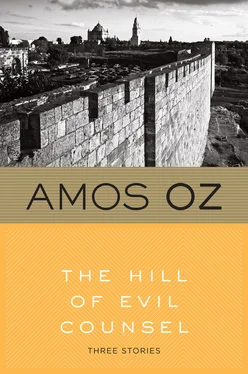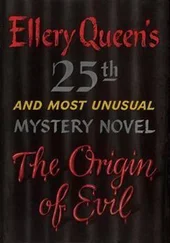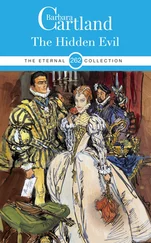In my mind's eye I followed this angry, lissome youth as he disappeared from my apartment into the evening shadows. Nachtshe, short for Menahem or Nahum, Guttmacher, in his shorts, with his tousled hair, his eyes the color of late-summer dust, his loneliness. No doubt he went back to his comrades, in the woods or the wadi. Dropping with fatigue, perhaps. Probably he hasn't eaten a proper meal in days. And I asked myself: Has he known a woman, and if so, was it the same way as he tore into the sandwich, or was he perhaps trembling, confused?
And what could I do, Mina? What would you have done in my place? Trusted him and said nothing? Rebuked him and made fun of his bravado? Tried to analyze his dreams? Or perhaps fallen in love and conquered him for yourself?
I feel at a loss. Perhaps I should have silenced him, squashed his arrogance, called him to order? But could I have done it? In my heart of hearts, as you must surely have guessed, I had made him into the secret child you bore me and hid from me in a kibbutz somewhere in Galilee, or in the valleys; he had grown up surrounded by horses and agricultural machinery, and now he had come up to Jerusalem to rescue us all. I must stop and conclude this letter at once.
Only this: when my visitors had left, while I was still washing the coffee cups and picking the crumbs off my rug, the sky suddenly altered. A damp, icy rage began to blow up from the northwest. Gone was the savage blue. Jerusalem darkened. Subsided. Then the first drops, and it was wintry night outside. I shall also start collecting empty bottles. At any rate, Nachtshe will have to come to me to learn what to put into a Molotov cocktail if he wants it to blow up an armored car. I shall stop now. I'll take a pill. I won't go to bed, I'll spend this rainy night in my laboratory. Time is short. Henry Gurney, the British administration secretary, is on the radio urging the members of all communities in Palestine to calm down and maintain law and order until the situation improves. The "Voice of Jerusalem" announcer translates into official Hebrew: It is strictly forbidden to congregate in the streets, it is forbidden to interfere with the normal course of life.
September 8, 1947
Dear Mina,
The rain was light. Not the autumn rains yet, but a slow night drizzle. This morning the city brightened again, and a damp, fresh smell rose from the gardens. Even the falling leaves today were washed clean of dust. I could not get to sleep until just before the dawn. I did not even want to. An idea for a formula kept running through my head after yesterday's meeting, a simple, fascinating chemical possibility, and I could not relax. From time to time the pain became so intense that the desk, the ceiling, and the walls went misty. I deliberately did without an injection, because it seemed to me that it was precisely in this mist that my hope of clarifying my idea lay. You are smiling. The notion of illumination or inspiration coming out of a fog of pain may strike you as immature romanticism. So be it. I even jotted down in the night various symbols and figures on a scrap of paper. Suddenly, long after midnight, as the Schneller clock struck three or two, with my tongue and palate parched from thirst and pain, in a mood of ecstatic longing, I had the feeling that I had discovered the way to produce a chain reaction by an amazingly simple means, with no need for fantastic temperatures. A way of releasing energy from the cheapest and commonest substances. It may be precisely thus that the elemental life force may erupt with holy dreadfulness in the mind of, say, a composer who hears in the night the strains of his final symphony, which is not yet his, and who knows that there is no way of capturing it in notes. Ecstasy and despair. I can decipher the meaning of all this: it is the rumor of approaching death. The bit of paper I scrawled on in the night is in front of me now, and it is all nonsense. Scientific ravings in the style of Jules Verne or H. G. Wells. It is worthless. What is more, at the time I was so feverish that I could see the Dead Sea blazing in the eastward-facing window, illuminating the night with a kind of mineral glare as of hellfire, and I did not doubt for a moment that my nocturnal discovery was already operating in the outside world. In a twilight. You and Uri were con coding something in the laboratory. You and Jasmine and Nachtshe on the rug, making love and calling me to join you. And outside a mushroom of fire bursting into the heart of the night sky, while I, with the help of a simple mirror, followed it from here, from my room, over the mountains and across the valleys. I fell asleep fully dressed again, toward dawn, on the floor of my laboratory, and in my sleep I knew that the time had come to send for Dushkin, and with him came Rabbi Zweik, the sick mystic from Safed, and together they tried to talk you into agreeing that the only way to arrest the tumor in my glands was to operate and remove my head, while you maintained strenuously that a heavy concentration of X-rays directed at a mixture of sodium and phosphorus would unleash a chain reaction that would save my life and also radically alter the overall military situation.
In the morning, after my coffee and a shave, I found I had a slight temperature and also some blurring of vision. I could read the newspaper, and I can still write. But when I reached out to pick up a piece of buttered toast from the kitchen table, I missed and upset a pot of yogurt. I may add, with no reference at all to this development, that a British reconnaissance plane has been circling low over Jerusalem since the early hours of this morning, perhaps because it was announced semiofficially in this morning's paper that the commission of inquiry will indeed recommend the partition of the country, and that Jerusalem and Bethlehem will be under international control, and will not be handed over either to the Jews or to the Arabs. It was Uri who told me, on his way home from school, that without Jerusalem there would be no Hebrew state, or else a terrible war would break out between the Hagganah and the Palmach, on the one hand, and the Irgun and the Stern Group on the other, and that that was precisely what the British were planning.
Incidentally, he is now in command of my laboratory. He does whatever he likes. He made me comfortable on the sofa, covered me with a woolen blanket, made me some lemon tea, and even selected a record and put it on the phonograph to please me. He also put a hot-water bottle on my feet. And while I was lying there, too weak to object, the boy began unloading a crate of empty bottles. Then he went to the laboratory to brew some concoction, chop off match heads, mix solutions. I am gradually being driven out of my own home: Nachtshe and Sonya Litvak in my kitchen, Uri in my laboratory, you in my dreams. Soon I shall leave.
"Be careful there, Uri."
"I'm only doing what you showed me, Dr. Emanuel, don't worry, I'm doing exactly what it says in your notes on the desk here, and when you're better we'll work together again."
I am at peace. Mozart on the phonograph, and from the laboratory sounds of test tubes, the spirit lamp, simmering.
Outside, at the window, another early-autumn evening.
The simple, searing, trivial things, what urgent information are they straining to convey to me. The fading light, Mina, the cawing of crows, a yelping dog, a ringing bell, these things have been since time immemorial and will go on being forever. I can even hear a train hooting in the distance, toward Emek Refaim. And a baby crying. And the woman next door singing a Polish song. The simple, familiar, trivial things — why do they seem to be taking their leave of me tonight. And what am I to do except turn to the wall and die at once. At once, too, like an electric shock, this limpid certainty strikes me: there is a meaning. There is a reason. Perhaps there is a way. And there is still some time left for me to try to discover the meaning, the purpose. Only a sadness continues to gnaw: I have lived some forty years. I was banished, more or less, from one country to another. Here I have even achieved something, to the best of my modest ability. Here, too, I loved you. And now you are gone and I am still here. But not for long. I am being rudely banished from this place, too. And the conclusion, Mina, the moral, the reason? What, as they say here, is the matter at hand?
Читать дальше











